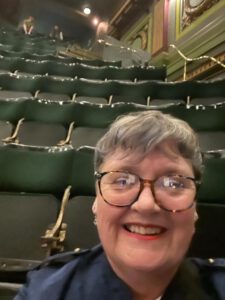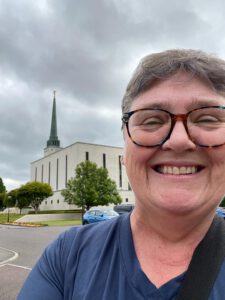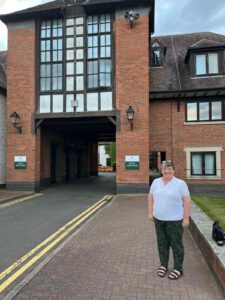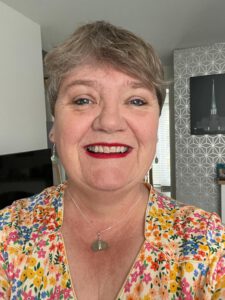I met Sister Jackie more than a decade ago through our Church community in the Middle East – the same one I mentioned in last month’s feature with Vicky. Jackie was in Oman, I was in Al Ain, and somehow, through our little expat ward, we became like a family away from home.
Back then, her family felt solid and grounded in faith. Like many of us, they carried their challenges quietly, with strength and grace. That’s why this story feels especially tender to share. I know that some who read this may remember her and her family from those years and may be surprised by what she shares here.
I just want to say gently – this isn’t the full story of a marriage or a family. It’s one woman’s lived experience, shared with permission and a lot of courage.
This space has never been about blame. It’s about honouring people’s stories as they are – complex, vulnerable, and deeply human. Jackie’s story is one of survival, spiritual awakening, and learning to reclaim her worth in the face of silence and pain.
Becoming Herself
Jackie became a mother at a young age, having three children by the age of 21. That same year, missionaries from the Church of Jesus Christ of Latter-day Saints knocked on her door in Newcastle Upon Tyne, England. It would mark a spiritual turning point: she was baptised on December 4, 1987.
Life, however, didn’t immediately become easier. At the time, her boyfriend – who she later married – was deeply unsupportive of her new faith. “He made my life very difficult,” she recalls. “We married in 1988, but he didn’t become any nicer. In fact, he was a lot more abusive.”
Eventually, she reached a breaking point – not because of what was happening to her, but what she witnessed happen to her child. “The wake-up call was when he slapped our two-year-old son for jumping on the sofa. Before that, there was always an ‘excuse’ for his violence toward me. But there is no excuse for striking a small child.” After he left, Jackie’s older children later revealed they had also suffered in silence.
A Different Kind of Heartbreak
Years later, Jackie remarried. Her second marriage, which lasted nearly three decades, brought new chapters – but also deep pain. In September of last year, she discovered that her husband – who was also their ward bishop – had formed an emotional attachment to another woman in their congregation. “They insisted it wasn’t a date because our daughter was with them,” she says. “But when I asked to come along, I was told I made things ‘awkward.’”
When Jackie confronted him about it, the emotional strain became nearly unbearable. “In the end, I really thought he was going to hit me,” she said. “He got so angry, I had to back away and go into another room.” When she didn’t back down or accept his excuses this time, he turned the narrative against her – telling others she was jealous, possessive, and unhinged. “He made it seem like I was making everything up,” she says. “It’s such a confusing thing – to be hurt and then blamed for your own hurt.”
Even in marriage therapy, his intent was revealing. “He told our therapist he wanted to take this other woman out to dinner without any ‘consequences’ from me,” Jackie shares. “The therapist told him that’s not something that happens in a monogamous relationship.”
Still, Jackie holds space for the complexity of it all. “He’s not a bad person,” she says. “I think he just took a wrong turn somewhere and forgot we were meant to be a team – two imperfect people trying to become perfect together.”
It was a confusing and painful time – one that shook not just her marriage, but her faith. Jackie had already given so much to her Church community, and the silence or indifference she felt from those around her only deepened the pain. “How could this be the Church of God when the leaders appeared to condone this behavior?” she remembers thinking.
Remembering Her Worth
At her lowest point, as she began to sort through her Church belongings with the intent to throw them out, a message popped up unexpectedly. “It was from a friend I hadn’t spoken to in nine years. I tried to brush her off, but she was persistent. She reminded me who I really was – “a daughter of God, a royal princess, a bad-a*s warrior in these last days.” That message – a simple, loving interruption – helped crack something open.
“Heavenly Parents didn’t let me come here without the tools to not just survive, but to thrive gloriously,” Jackie says. “When I was younger, I thought success was the love of a man. But now, it’s emulating my Savior, Jesus Christ.”
Jackie surrounds herself with reminders for hard days. She keeps quotes on her walls and in her journal, like: “Some days are better, some days are worse. Look for the blessing instead of the curse.”
“Be like the frog who fell into a cream jug… she kept swimming until the cream turned to butter, and she hopped out.”
Her goals now are simple, but rooted in strength: to keep becoming the version of herself that God sees. “I love lying under the sky, thinking. I really am blessed,” she says. “We hear, ‘Love thy neighbour as thyself,’ but I think we forget to love ourselves. It’s not selfish. You are a thing of wonder and beauty. Acknowledge it often.” she adds.
After Everything, She Still Smiles
Looking at the photos Jackie shared – some recent, some from years past, what stands out most is her smile. It’s warm, open, and steady – the kind of smile that makes it easy to forget just how much she’s endured.
Maybe that’s part of her quiet strength: the ability to keep showing up with grace, even when life has broken her heart in private. There’s a softness to her presence, but also a resilience that lives beneath it – and maybe that’s what makes her story so quietly powerful.






My Reflection of Jackie’s Journey
What I didn’t expect, while working through Jackie’s story, was how much it would sit with me afterward. Not just the pain she shared – but the quiet strength it takes to live through something, and then say it out loud.
It reminded me that even when we think we understand someone’s life, we rarely see the full picture. And it also reminded me that stories like these aren’t shared to justify, or accuse – but to heal. To make sense of chaos. To reclaim voice.
It’s never easy to sit with complicated things. Especially when you care about the people involved. But I believe in the value of holding space for truth – even when it’s imperfect, or tender, or one-sided. Because real life is often all of those things.
I still don’t have the full story – and I don’t need to. What I do know is this: Jackie’s voice matters. And I’m honored she trusted me to carry part of it here.
